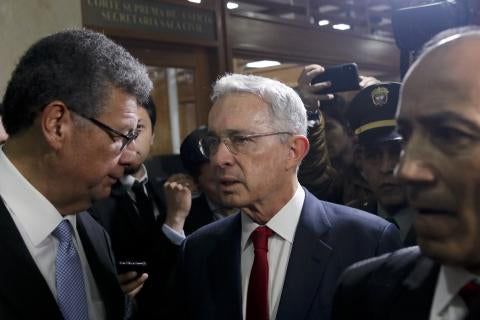Colombia’s former president Álvaro Uribe has been found guilty of bribery and witness tampering in a landmark trial that has driven debate over the conservative hardliner’s legacy.
Uribe was convicted on Monday of attempting to bribe a former paramilitary to change earlier testimony that alleged he had created and financed a paramilitary group in the 1990s during Colombia’s internal conflict.
Uribe, 73, governed Colombia from 2002-2010, during which time he battled leftist rebel groups including the Revolutionary Armed Forces of Colombia (Farc), which at the time controlled swaths of the country.

The verdict, in a case that has run for nearly 13 years, is the first time a former Colombian president has been found guilty of a crime.
Uribe — appearing virtually from his country home outside the western city of Medellín — shook his head as the verdict was read.
“Justice does not kneel before power,” Judge Sandra Liliana Heredia told the court on Monday before delivering a verdict that would take 10 hours to read. “It is at the service of the Colombian people.”
While Uribe has yet to be sentenced, his crimes carry a sentence of six to 12 years in prison.
“This is not the end of this process,” Juan Felipe Amaya, a lawyer from Uribe’s team, told reporters outside the court in Bogotá, the capital. “The appeal is next and we are going to demonstrate that this decision, which we respect, is wrong.”
Uribe has been the dominant political figure in Colombia over the past quarter-century — adored by his supporters for bringing security and then investment but loathed by his detractors for the at-times brutal conduct of military campaigns during his presidency.
In what is now known as the “false positives” scandal, members of the armed forces executed thousands of civilians, declaring them enemy combatants in order to boost combat kill statistics. He has also been accused of empowering rightwing paramilitaries to act alongside the military.
Uribe’s military success against Farc is considered a major factor in having driven the guerrillas to conclude a peace deal with his successor Juan Manuel Santos in 2016, a process that Uribe vehemently opposed.
Uribe’s conviction comes at a period of heightened tension in Colombia, with armed groups seeking to reinforce themselves amid faltering negotiations with the government of President Gustavo Petro, himself a former member of a rebel group. Elections are due next year.
Conservative senator Miguel Uribe Turbay, who is not related, was severely wounded in an assassination attempt in Bogotá on June 7.
The US — which backed Uribe’s war on rebel groups — defended the former president on Monday, with secretary of state Marco Rubio writing on X that “Uribe’s only crime has been to tirelessly fight and defend his homeland”.
“The weaponisation of Colombia’s judicial branch by radical judges has now set a worrisome precedent,” Rubio wrote.
Sergio Guzmán, who heads the Bogotá-based consultancy Colombia Risk Analysis, said that accusations of “lawfare” were unfair.
“The verdict is about whether or not Uribe conspired with other people under his direction to change testimonies to his benefit, to manufacture evidence, and to mislead the court,” Guzmán said. “It’s not about whether Uribe was a good president, or whether he was a bad president.”